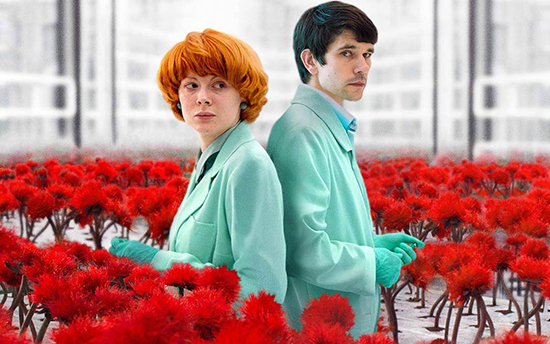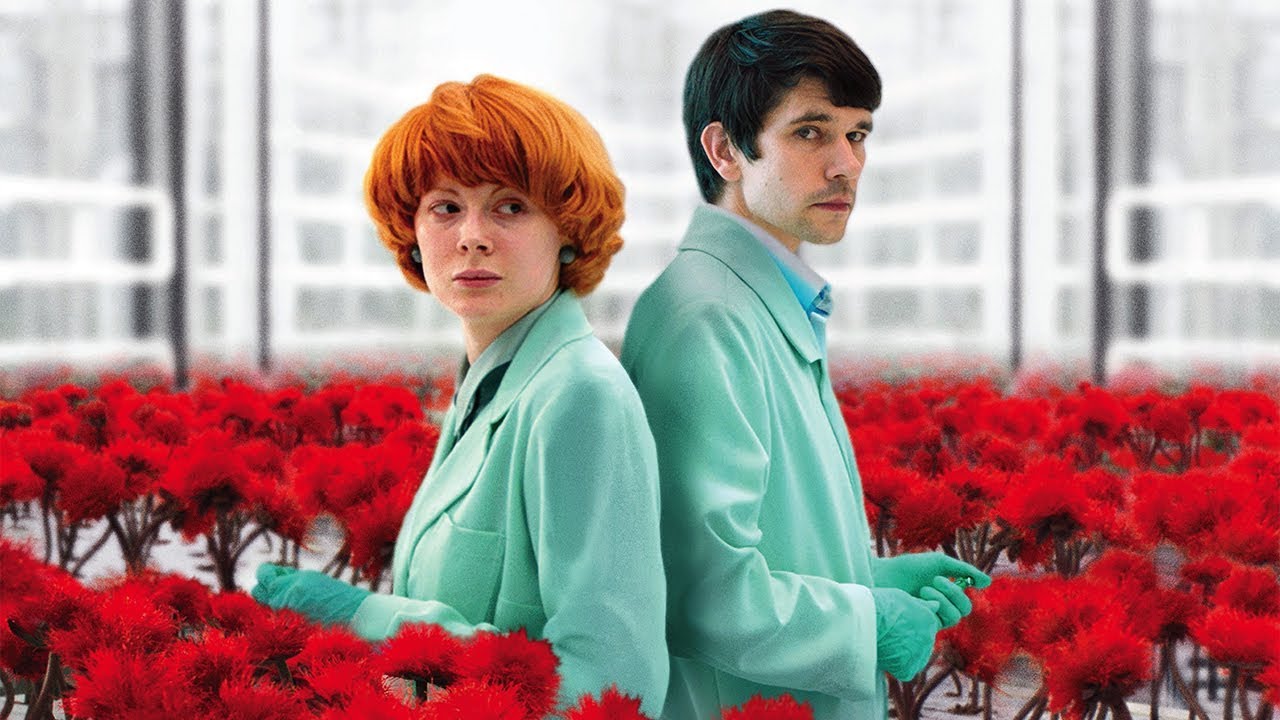In Little Joe, the fifth feature by Jessica Hausner, scientists try to make scents out of otherworldly flowers. The plants, nicknamed Little Joe, are manufactured to emit happiness via their smell. Customers sniff the tendrils, and then – well, that’s where it gets tricky. Does the flower provide an energy boost like coffee? How can human happiness be measured? With coffee spoons? And does happiness, as a concept, actually exist?
Early on, Alice (Emily Beecham), an engineer at the fictional company Plantworks, starts to notice subtle changes in her co-workers and in her adolescent son, Joe (Kit Connor). Not so much big, cheery smiles, but slight personality shifts. Instead of injecting jolts of joy, the plant has seemingly taken over these human cells, like it’s an unofficial remake of Invasion of the Body Snatchers. Or so Alice wonders. Hausner’s masterstroke is that the effect is so minimal, Alice can’t pinpoint what’s transformed in her son. The boy looks like Joe – but he just isn’t Joe.
Likewise, Little Joe is somewhat unclassifiable as a movie. It looks like a sci-fi, but it isn’t a sci-fi. There’s a Kubrickian laboratory, futuristic flowers, and a colour palette that’s out of this world. But instead of delivering fantastical hijinks, the drama is subdued and grounded. You could label it a horror or a comedy, but there’s an absence of scary moments and the setups outnumber the punchlines. Whenever an action sequence threatens to break out, it doesn’t. By defying genre conventions, the film is anti-sci-fi, anti-horror, anti-comedy and anti-thriller. Chuck in directorial decisions that contradict the storytelling, it’s also anti-filmmaking.
“Did you call it anti-filmmaking?” says Hausner, bemused, when we meet in a café during the London Film Festival. Oops. Was that the wrong term to use? “I’ve never heard that before. It sounds cool.” She mulls it over, then laughs. “Anti-filmmaking? I feel like my world sales agent would say the same.”
Let me explain. In Little Joe, the camera will, for instance, zoom in on a spot on the wall and push the characters out of frame; often, the music will not align with what’s tonally unfolding in a scene. “I was never intrigued by traditional filmmaking,” the Austrian director says. “Auteur filmmaking is about doing something different. You reinvent filmmaking. You find your own language, and you express your point of view. When I see that in other films, it’s very touching, because it’s someone daring to show herself or himself naked.”
What unites Hausner’s films is a precision in their style. Take Lourdes, Hausner’s anti-comedy from 2009, which starts with a fixed shot of tables and decorative plants; as the opening credits unspool, humans slot themselves into the frame like chess pieces on a board. Similarly, in Little Joe and 2014 anti-romance Amour Fou, the title cards are accompanied by characters fussing over flowers – a meta commentary on filmmaking? Or just an eco-friendly introduction? Either way, the 19th-century period costumes of Amour Fou can’t muffle Hausner’s mischievous voice. Above all, the ambiguities of these narratives deliberately frustrate the moviegoer.
“Fifteen years ago, I made a film called Hotel which was maybe too much ‘anti-filmmaking’,” Hausner chuckles. “The audience responded with, ‘Huh? What was that about?’ It went too far. But with Little Joe, you think about it for two more days.” So Little Joe requires a second viewing? “My films are always open to different interpretations. They’re like puzzles where some of the pieces are missing, or someone lost them. As an audience, you fill in those gaps. So if you see the film a second time, you get into your own interpretation better.”
In terms of commercial viability, Little Joe is Hausner’s first film in English. She’s done two in French, two in German. “I don’t feel very Austrian. And this film is a rethinking of Invasion of the Body Snatchers, so the English language fits the project.” Did she consider a straight remake? “I think Warner Bros owns the rights. I knew I’d change the story so much that they wouldn’t want to produce it. Maybe I should’ve tried. But I don’t want studio bosses telling me what to do.”
In Hausner’s auteur-driven inversion of the body snatchers, the odd behaviour of those infected by Little Joe’s pollen could be mistaken for general British awkwardness. Subsequently, Alice scrutinises every human interaction for clues. Her eyebrows are constantly raised, her eyes are filled with concern; outside of some expository sessions with a therapist, the paranoia plays out internally. For the role, Beecham won the Best Actress prize at Cannes.
“Emily has a way of acting where you want to know what’s going on within her, but she doesn’t show it,” Hauser notes. “She reminded me so much of Catherine Deneuve when she was young. This actress had this amazing face that is very beautiful but also very mysterious, because you think: ‘Is she cold? Does she have feelings? What is she attached to?’”
Opposite Beecham is Ben Whishaw as Chris, an irritating colleague with a crush and propensity for violence. It’s not what you’d expect from the voice of Paddington Bear. “Ben has a similar thing. He looks very boyish and nice, but at the same time, you feel there’s a second layer, or some monster lurking around the corner.”
In preparation, Hausner and her co-writer Géraldine Bajard researched the “Capgras delusion”, a psychiatric disorder in which sufferers believe loved ones have been replaced by imposters. The illness is name-dropped in Charlie Kaufman’s Synecdoche, New York when Phillip Seymour Hoffman casts actors to play his family. “It’s a very basic feeling,” Hausner says. “It’s not only a disease. I’m incredibly astonished, again and again, that the people I think I know well are like aliens to me at the same time.”
Although Little Joe resembles a colourful Rorschach test, the juxtaposition of Joe and Little Joe is more overt. Both are Alice’s creations, and they vie for her affections – one just needs a bit more sustenance than water. “We have an image that mothers should love their child more than anything. But Alice loves the child and she loves her profession. What fathers experience is what mothers experience. It’s a taboo to dare say that.”
A more controversial taboo, one raised by a few critics, is whether the plant could be a metaphor for antidepressants. If so, the horror aspects – or anti-horror, rather – aren’t so generous towards the mental health industry. But Hausner doesn’t agree with this interpretation. “I think it’s a two-sided thing,” she says, picking her words carefully. “What’s your real personality? If you have depression and you take a drug and you feel better – then why not? That’s you as well. I’d prefer to see it from that side, rather than ‘Don’t take drugs because you’re not yourself anymore.’
“That’s the fun of the story: we don’t know if the plants change people or not. Because, basically, we don’t know who that other person is. What is the other person when he or she changes? You cannot know what a person is like.”
When Hausner is discussed, journalists frequently bring up Michael Haneke (Hausner was a crew member on the 1997 version of Funny Games) and Yorgos Lanthimos (an unhelpful shorthand for anything with deadpan dialogue). The inspiration she’d rather cite, though, is the avant-garde pioneer Maya Deren. As a tribute to Deren, Little Joe’s soundtrack mostly comprises three tracks by Teiji Itō, the Japanese artist who scored Meshes of the Afternoon and Meditation on Violence. The instrumentals – recorded in 1971 – include a drum fill that sounds like a ball bouncing down a flight of stairs. It’s not exactly futuristic Blade Runner synths.
“The idea came from my desire to do things that are slightly irritating,” Hausner explains, laughing. “Why would you have Japanese drums on a sci-fi arthouse thriller? That convinced me immediately. Sometimes the music goes well with the scenes, and in other situations not so well. It’s like what we said before: as an audience, you think, ‘Huh?’”
When the percussion drowns out conversations, it emphasises that the characters aren’t in control of their universe. In turn, the actors are puppets to Hausner’s esoteric camera angles and postproduction amendments. On Lourdes, Hausner recalls, there was an argument when shooting the climax (“Sylvie Testud wanted to be more in the middle of it all”), but Beecham and Whishaw were game for anything. On a second viewing, their placement within the frame may even offer further hints.
“A lot of people expect the film to tell you what to think and see. If a film doesn’t do that, you’re irritated. And only then do you start to think, ‘This might be on purpose. Maybe this is what the film is trying to say.’ That’s why it takes a while. Even if you don’t see it twice – people have told me it took four days to understand it.” So are some viewers misreading the film? “That’s not even possible. The only misreading would be if you think you know what’s happening.”
Since Little Joe’s premiere at Cannes last year, Hausner has received a flurry of sci-fi scripts, although she teases that her next film will end any genre pigeonholing. I’d love to know more, but, as our conversation overruns, she receives phone calls from a journalist in Romania who’s growing impatient. So I only have time for one last question. The plant makes you happy – what does that actually mean?
“I don’t think happiness exists in real life,” Hausner says. “It’s an idea we have, a desire. As soon as it arrives, it’s already vanished. It’s a basic fantasy everyone has. It’s also a disease of our times. There’s a strong law, even, in western society to pretend that you’re happy. You have to pretend to be happy, to be successful, and to love your life.
“But who does? It’s so ridiculous. I find it, sometimes, depressing if people pretend that they’re happy. I would rather admit that happiness is just an idea. We do not need to be happy.”
Little Joe opens in UK cinemas on February 21. Information on the BFI’s Jessica Hausner season can be found here



